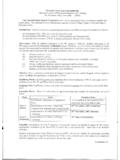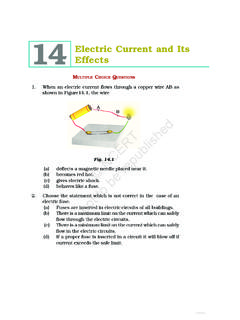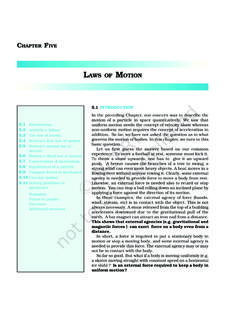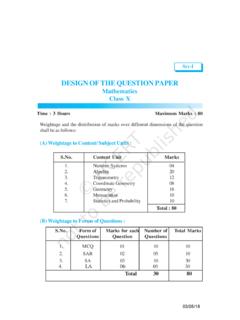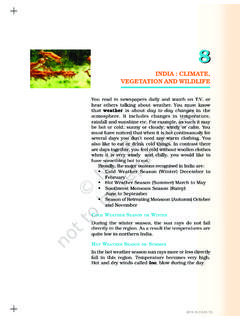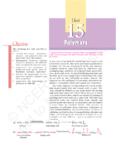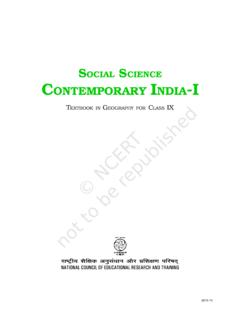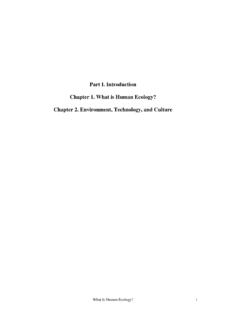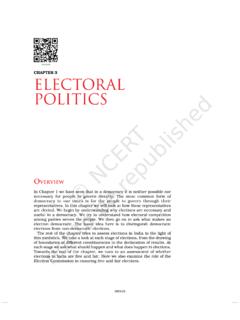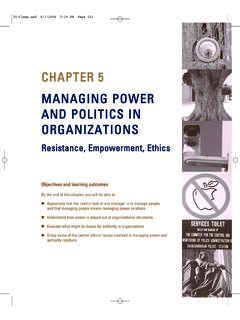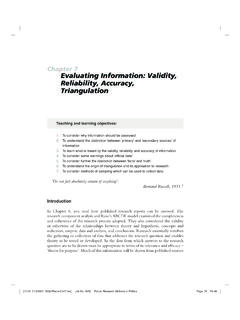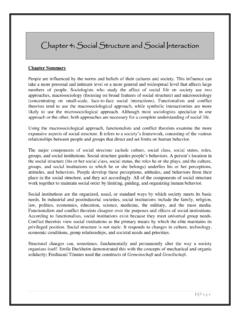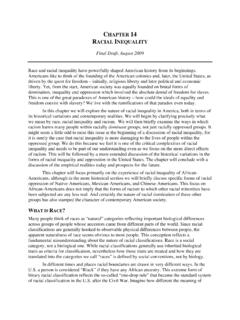Transcription of Final Chapter 6
1 Political Parties71 Chapter 6 OverviewIn this tour of democracy, we have come across political parties severaltimes. In Class IX, we noticed the role of political parties in the rise ofdemocracies, in the formation of constitutional designs, in electoralpolitics and in the making and working of governments. In thistextbook, we have glanced at political parties as vehicles of federalsharing of political power and as negotiators of social divisions inthe arena of democratic politics . Before concluding this tour, let ustake a close look at the nature and working of political parties,especially in our country. We begin by asking two common questions:Why do we need parties? How many parties are good for a democracy?In the light of these, we introduce the national and regional politicalparties in today s India and then look at what is wrong with politicalparties and what can be done about Parties2015-16(19/01/2015)72 Democratic PoliticsWhy do we need political parties?
2 Political parties are easily one of the mostvisible institutions in a democracy. Formost ordinary citizens, democracy is equalto political parties. If you trav el to remoteparts of our country and speak to theless educated citizens, you could comeacross people who may not knowanything about our Constitution or aboutthe nature of our government. Butchances are that they would knowsomething about our political parties. Atthe same time this visibility does not meanpopularity. Most people tend to be verycritical of political parties. They tend toblame parties for all that is wrong withour democracy and our political have become identified withsocial and political , it is natural to ask dowe need political parties at all? Abouthundred years ago there were fewcountries of the world that had anypolitical party.
3 Now there are few thatdo not have parties. Why did politicalparties become so omnipresent indemocracies all over the world? Let usfirst answer what political parties are andwhat they do, before we say why we political party is a group of peoplewho come together to contest electionsand hold power in the government. Theyagree on some policies and programmesfor the society with a view to promotethe collective good. Since there can bedifferent views on what is good for all,So, you agreewith me. Partiesare partial,partisan and leadto donothing butdivide is their realfunction!Election Commission has officially banned wallwriting by parties during election times. Mostpolitical parties argue that was the cheapest way fortheir campaign. These election times used tocreate amazing graffiti on the walls.
4 Here are someexamples from Tamil Nadu.(1)(2)(3)(4) (1) M Govarthan (2) A Muralidharan (3) M Moorthy (4) T Singaravelou, The Hindu2015-16(19/01/2015)Political Parties73 Partisan: A personwho is stronglycommitted to a party,group or is markedby a tendency to take aside and inability to takea balanced view on anissue. RK Laxman - Brushing up the yearsparties try to persuade people why theirpolicies are better than others. They seekto implement these policies by winningpopular support through , parties reflect fundamentalpolitical divisions in a society. Par ties areabout a part of the society and thusinvolve PARTISANSHIP. T hus a party isknown by which part it stands for, whichpolicies it supports and whose interestsit upholds. A political party has threecomponents:lthe leaders,lthe active members andlthe followersFunctionsWhat does a political party do?
5 Basically,political parties fill political offices andex ercise political power. Parties do soby performing a series of functions:1 Par ties contest elections. In mostdemocracies, elections are fought mainlyamong the candidates put up by politicalparties. Par ties select their candidates indifferent ways. In some countries, suchas the USA, members and supportersof a party choose its candidates. Nowmore and more countries are followingthis method. In other countries like India,top party leaders choose candidates forcontesting put forward differentpolicies and programmes and thevoters choose from them. Each of usmay have different opinions and viewson what policies are suitable for thesociety. But no gov ernment can handlesuch a large variety of views. In ademocrac y, a large number of similaropinions have to be grouped togetherto provide a direction in which policiescan be formulated by the gov his is what the parties do.
6 A partyreduces a vast multitude of opinions into2015-16(19/01/2015)74 Democratic PoliticsOkay, grantedthat we can t livewithout politicalparties. But tellme on whatgrounds dopeople support apolitical party?a few basic positions which it government is expected to baseits policies on the line taken by theRULING play a decisive role in makinglaws for a country. Formally, laws aredebated and passed in the legislature. Butsince most of the members belong to aparty, they go by the direction of theparty leadership, irrespective of theirpersonal form and run gov we noted last year, the big policydecisions are taken by political executivethat comes from the political recruit leaders, train them and thenmake them ministers to run thegovernment in the way they parties that lose in the electionsplay the role of opposition to the partiesin power, by voicing different views andcriticising government for its failures orwrong policies.
7 Opposition parties alsomobilise opposition to the shape public opinion. Theyraise and highlight issues. Parties havelakhs of members and activists spreadall over the country. Many of the pressuregroups are the extensions of politicalparties among different sections ofsociety. Parties sometimes also launchmovements for the resolution ofproblems faced by people. Oftenopinions in the society crystallise on thelines parties provide people access togovernment machinery and welfar eschemes implemented by gov er an ordinary citizen it is easy toapproach a local party leader than agovernment officer. That is why, they feelclose to parties even when they do notfully trust them. Parties have to beresponsive to people s needs anddemands. Otherwise people can rejectthose parties in the next list of functions in a sense answersthe question asked above: we needpolitical parties because they perform allthese functions.
8 But we still need to askwhy modern democracies cannot existwithout political parties. We canunderstand the necessity of politicalparties by imagining a situation withoutparties. Every candidate in the electionswill be independent. So no one will beable to make any promises to the peopleabout any major policy changes. Thegovernment may be formed, b ut itsutility will remain ever uncertain. Electedrepresentatives will be accountable to theirconstituency for what they do in thelocality. But no one will be responsiblefor how the country will be can also think about it by lookingat the non-party based elections to thepanchaya t in many states. Although, theparties do not contest formally, it isgenerally noticed that the village gets splitinto more than one faction, each ofwhich puts up a panel of its is exactly what the party does.
9 T ha tis the reason we find political parties inalmost all countries of the world,whether these countries are big or small,old or new, developed or rise of political parties is directlylinked to the emergence ofre presentative democracies. As we haveseen, large societies need representativedemocracy. As societies became largeand complex, they also needed someagency to gather different views onvarious issues and to present these tothe government. They neededRuling Par ty: Politicalparty that (19/01/2015)Political Parties75some ways, to bring variousrepresentatives together so that aresponsible government could beformed. They needed a mechanismto support or restrain thegovernment, make policies, justify orCategorise these photographs by the functions of political parties theyillustrate.
10 Find one photograph or news clipping from your own area foreach of the functions listed them. Political parties fulfillthese needs that every representativegovernment has. We can say thatparties are a necessary condition fora many parties should we have?In a democracy any group of citizens isfree to form a political party. In thisformal sense, there are a large numberof political parties in each country. Morethan 750 parties are registered with theElection Commission of India. But notall these parties are serious contenders inthe elections. Usually only a handful ofparties are effectively in the race to winelections and form the gov ernment. Sothe question, then is: how many majoror effective parties are good for ademocracy?In some countries, only one party isallowed to control and run the are called one-party :Activists of BJP Mahila Morcha demonstrate against hike in prices of onions and LPG :Minister distributes Rs One lakh cheque to the families of hooch victims at their :Activists of CPI (M), CPI, OGP and JD (S) take out a rally in Bhubaneswar to protest againstPOSCO, the Korean steel company for being permitted by the State Government to export ironore from Orissa to feed steel plants in China and Korea.

